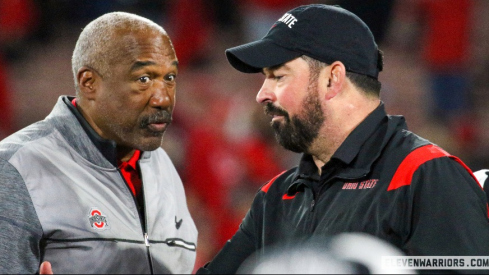
The BCS died yesterday at the age of 16, surrounded by friends, family, well-wishers, snarky assholes on the internet, and television executives who mourned most of all. It is survived by a fledgling playoff system that will inevitably make everyone just as mad as it did, carrying on the fine collegiate tradition of giving people what they think they want at the expense of giving people what they actually need.
It is well and good that we meet here today, to celebrate the life and death and especially the death of the BCS. But first, a few words.
The BCS was an okay championship system. It was part of us. It was a system that loved money... and football, and as a system it explored the mountains of California, the streets of New Orleans, the beaches of Miami, and the desert of Tempe, Arizona. It died, like so many other championships of its generation, well beyond its time. In your wisdom, Bill Hancock, you took it, like so many flawed and crappy attempts to discern between teams of similar abilities. These systems gave their lives. And so would the BCS. The BCS, which loved money.
And so, Bowl Championship Series, in accordance with what your wishes might well have been, we commit your remains to the bosom of the Rose Bowl, which you loved so well. And money.
Goodnight, sweet prince.
The BCS was started in the 1998 season as part of an initiative to bring a "true" national champion to college football. A more logical setup might've been to do a playoff like, oh I don't know, literally every sport at every level around the world does, but part of the appeal of college football is that it's a willfully ridiculous mess of half baked ideas cranked up to 11.
It had its genesis in the Bowl Coalition, which you probably had forgotten about because it was dumb. It was dumb because the Pac-10 and the Big Ten were both stricken with a severe case of Stockholm Syndrome with their captors, the Tournament of Roses Association, and refused to participate. Since this was a point in history when the Big Ten was actually good/relevant, it kind of put a damper on things.
When the next iteration popped up, called the Bowl Alliance, it had the exact same problem. The Rose Bowl was jealously guarded by the Big Ten and the Pac-10, and thus both conferences and said bowl were not a part of it. Still dumb.
 Yeah! Give us hell, Quimby!
Yeah! Give us hell, Quimby!Finally, we got our BCS. Tired of split national championships awarded by the Associated Press or the Coaches' Poll, or in the case of Alabama, some random ass dude named Deke, college football finally got a procedure for determining a true national champion so as to avoid the Piggly Wigglies of the world claiming that Mississippi State had won a championship on the basis of "just being a good group of young fellas."
And we immediately trashed it. Not because of what it was, but because of how it was implemented. Too many computers, reliance on this over that, preseason polls having way too much significance, whatever. Likewise, the BCS will be eulogized in many columns and articles similar to this one, either mourning it (for real, because being contrarian gets you pageviews), or dancing on its grave.
I'm definitely in latter camp. Which is kind of hypocritical since I, an Ohio State fan, have benefited from the BCS system more than a fan of almost any other collegiate football team.
No team had more BCS bowl appearances than Ohio State, with 10. No team had more victories in BCS games than Ohio State, with six (USC also had six, and maybe Ohio State only really had five, if you're a douche). Plus, the BCS gave Ohio State its first outright national championship in decades. Not a ton to complain about there.
But complain we will, because there was a lot to complain about. The BCS was a convoluted system that Ohio State was able to game by being incredibly dominant in a generally very weak conference, but as much as it benefited us, it put demands on other schools that segregated the haves and have nots with near perfect consistency. When teams from minor conferences were actually allowed to play against the traditional powerhouses, they won more than they lost, but that rarely happened. For every Boise State/Oklahoma, there were three Alabama/Notre Dames (or, yeah, Florida/Ohio States). The BCS was set up to maximize profits by getting the biggest names in college football to play against each other in the biggest bowl games, and in that it succeeded.
Spencer Hall and Matt Hinton both have already written about the BCS' failures; Hall says it was a facile "repackaging of existing goods," Hinton says that the BCS was a POS but ultimately "serve[d] its purpose." Both of those scalding hot sports takes are right, but I think they both miss the mark somewhat on what our overall frustration truly was with the Bowl Championship Series.
The BCS' biggest flaw, the real problem that was its ultimate downfall, is that it demanded perfection out of a sport that is distinctive and notable precisely because of its imperfections. No one watches college football for precision or efficiency, and no one who watches college football really watches to see a dynasty. People like stupid upsets, ridiculous plays, and an atmosphere of complete insanity where anything could happen. The BCS was the antithesis of this. It tried to force a kind of order on a sport that works best in a perpetual state of madness.
And hopefully that's eventually what we get. As it stands, four teams is not great. Six teams would be better, and eight would be just about right. But it's a step in the right direction.
We're always going to have something to complain about, because we're a bunch of fickle mush-heads who don't know what we want. The committee members are biased, schedules are weird, the timing on the games isn't right, whatever. That's fine, because now error is a part of the system, and teams are allowed to be as gloriously imperfect as the sport that we love.
Requiescat in pace, BCS. You were too perfect for this world.

